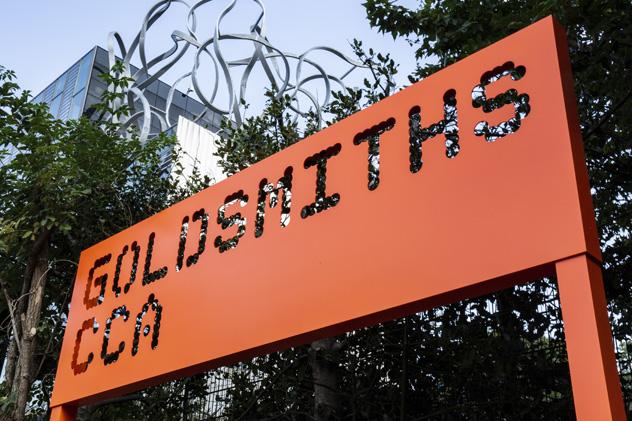
The MFA Curating at Goldsmiths is designed for students who wish to take up the challenge of artistic, social and critical curating with a contemporary approach to the subject. It also helps students to develop their professional practice.
If you have specific questions about the degree, contact Anna Colin or Helena Reckitt.
2 years full-time or 4 years part-time
Home - full-time: £10350
Home - part-time: £5175
International - full-time: £25270
The MFA gives you the chance to develop your practice. You’ll have the opportunity to apply to work with organisations like Chisenhale Studios, Gasworks, Forma, Artangel, the Government Art Collection and our close collaborator Goldsmiths Centre for Contemporary Art to develop curatorial projects.
Such placement opportunities and internships with the likes of Tate Modern, The Mosaic Rooms, and Create London will underpin your learning and give you the practical skills you need for your future career.


Based in our world-renowned Department of Art, the MFA Curating allows for dialogue and potential collaborations with emerging practitioners about contemporary and future practice, and the most pressing concerns of our day.
Upon graduation, art alumni are eligible to apply for one of four Junior Fellowships, designed to further your professional development. Currently we offer two fellowship to work with the MFA Curating course itself, taking part in the delivery of an academic programme, and two fellowships based at Goldsmiths CCA, supporting the delivery of exhibitions and public programmes.
The MFA Curating is a two-part programme, giving you you the freedom to experiment and innovate in the expanded and interdisciplinary field of curatorial practice.
You'll develop an Independent Research Project with the guidance of tutors.
You’ll also be introduced to current curatorial concepts and practices through group critique and guided research. You’ll explore significant ideas in curatorial history, contemporary art and curating, philosophy and cultural theory to help you think broadly about your own practice.
You’ll also gain a practical understanding from site visits and writing classes.
The year is made up of the following modules:
You’ll develop a second Independent Research Project and continue to receive group and individual tutorials.
This year your teaching is mainly delivered in the form of monthly intensive student-led workshops, which look in-depth at current artistic and cultural themes drawn from students’ interests.
The year is made up of the following modules:
Teaching on this programme is dynamic. You’ll expand your artistic and curatorial knowledge through ongoing conversations in the form of seminars, collective research, presentations, tutorials and reading groups.
As well as being taught by leading academics from the Department of Art, you’ll also learn from some of the art world’s most influential professionals through our visiting lecture and guest speaker programmes.
Show more informationRecent speakers have included independent curators, artists, and professionals from galleries such as the Tate Modern and The Courtauld, London; CAPC, Bordeaux; TBA21 Academy, Vienna; MACBA, Barcelona; and Palais de Tokyo, Paris.
Our graduates find employment in a range of leading arts-based organisations and sectors. Recent graduates have gone on to work in international museums, commercial galleries, art fairs, magazines, alternative spaces and not-for-profit organisations. Recent employers of our MFA Curating students and graduates include:
Some of our graduates have founded their own projects and galleries. Among these are:
Other graduates choose employment as:
Through the course of the MFA you'll develop key skills in:

The course played a huge role in shaping the kind of curator I have become.
Students studying this programme are based in dedicated postgraduate studio space in the Laurie Grove Baths, at the centre of the campus, right next to Goldsmiths CCA.
During the year we hold regular Postgraduate Art Open Days that we encourage you to attend if you can.
You can also explore our exhibitions, events and other work on the Department of Art pages.
Global reputation Goldsmiths is ranked 4th in the UK and top 25 in the world for art (QS WUR by Subject 2024). Graduate prospects Our graduates find employment in a range of leading arts-based organisations and sectors. Placement opportunitiesPlacement opportunities and internships will underpin your learning and develop your professional skills.
You must have or expect to be awarded an undergraduate degree of at least second class standard (or international equivalent), plus an element of professional experience (interning in a gallery or equivalent institution, curating your own shows or degree shows etc). This experience is absolutely essential to demonstrate that you have a clear sense of current trends and activities in contemporary art. This experience should be expanded upon in your personal statement.
There's no preference for art/art history and students from a non-art background are welcome to apply. However, the course is run by the Department of Art, and students should consider themselves to be curating practitioners.
You must have already completed and passed the coursework of one year for an equivalent Masters programme in Curating. You must also show through interview and (where appropriate) portfolio that you have established a professional practice. This experience should be expanded upon in your personal statement.
We accept a wide range of international qualifications. Find out more about the qualifications we accept from around the world.
If English isn’t your first language, you will need an IELTS score (or equivalent English language qualification) of 6.5 with a 6.5 in writing and no element lower than 6.0 to study this programme. If you need assistance with your English language, we offer a range of courses that can help prepare you for postgraduate study.
These are the PG fees for students starting their programme in the 2024/2025 academic year.
If your fees are not listed here, please check our postgraduate fees guidance or contact the Fees Office, who can also advise you about how to pay your fees.
It’s not currently possible for international students to study part-time under a student visa. If you think you might be eligible to study part-time while being on another visa type, please contact our Admissions Team for more information.
If you are looking to pay your fees please see our guide to making a payment.
Explore the Goldsmiths scholarships finder to find out what funding you may be eligible for.
If you are a UK student you may be eligible for a postgraduate loan.
Meanwhile our Careers Service can also offer advice on finding work during your studies.
In addition to your tuition fees, you'll be responsible for any additional costs associated with your course, such as buying stationery and paying for photocopying. You can find out more about what you need to budget for on our study costs page.
There may also be specific additional costs associated with your programme. This can include things like paying for field trips or specialist materials for your assignments. Please check the programme specification for more information.
You apply directly to Goldsmiths using our online application system.
To complete your application, you will need to have:
If appropriate, your application can be accompanied by images showing examples of previous curatorial projects (it's not necessary to showcase your own art work). You can upload images or link to your online portfolio in your application.
Make sure you refer to your work experience in your personal statement.
If you have completed an internship, please be specific about what this entailed and how it is relevant to the programme. Also mention which curators/practioners have influenced you – we are looking for individuals with specific passions. It may be relevant to mention specific exhibitions or artworks that you have seen in person that were meaningful to you (and explain why), or discuss the art-specialist magazines or books that you have read.
In summary, be prepared to discuss the specific elements (whether artworks, artists, art writing, philosophy, exhibitions, or more) that brought you to take a special interest in contemporary art curating.
You can apply all year round but there is a deadline of 26 January for entry for the following September.
Admissions interviews predominantly take place from January to April in the year of academic enrolment. In unusual circumstances, late or early applicants will be considered. Please contact the Department of Art for details.
We encourage you to complete your application as early as possible, even if you haven't finished your current programme of study. It's very common to be offered a place that is conditional on you achieving a particular qualification.
If you're applying for funding, you may be subject to an earlier application deadline.
You'll be able to save your progress at any point and return to your application by logging in using your username/email and password.